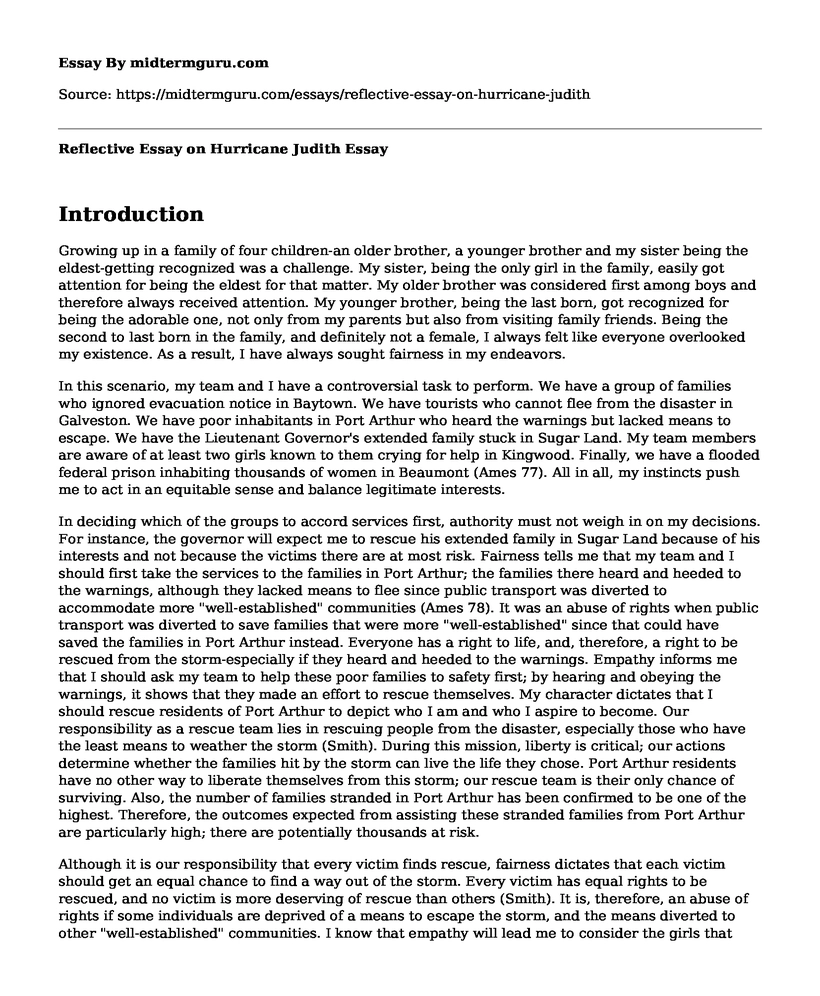Introduction
Growing up in a family of four children-an older brother, a younger brother and my sister being the eldest-getting recognized was a challenge. My sister, being the only girl in the family, easily got attention for being the eldest for that matter. My older brother was considered first among boys and therefore always received attention. My younger brother, being the last born, got recognized for being the adorable one, not only from my parents but also from visiting family friends. Being the second to last born in the family, and definitely not a female, I always felt like everyone overlooked my existence. As a result, I have always sought fairness in my endeavors.
In this scenario, my team and I have a controversial task to perform. We have a group of families who ignored evacuation notice in Baytown. We have tourists who cannot flee from the disaster in Galveston. We have poor inhabitants in Port Arthur who heard the warnings but lacked means to escape. We have the Lieutenant Governor's extended family stuck in Sugar Land. My team members are aware of at least two girls known to them crying for help in Kingwood. Finally, we have a flooded federal prison inhabiting thousands of women in Beaumont (Ames 77). All in all, my instincts push me to act in an equitable sense and balance legitimate interests.
In deciding which of the groups to accord services first, authority must not weigh in on my decisions. For instance, the governor will expect me to rescue his extended family in Sugar Land because of his interests and not because the victims there are at most risk. Fairness tells me that my team and I should first take the services to the families in Port Arthur; the families there heard and heeded to the warnings, although they lacked means to flee since public transport was diverted to accommodate more "well-established" communities (Ames 78). It was an abuse of rights when public transport was diverted to save families that were more "well-established" since that could have saved the families in Port Arthur instead. Everyone has a right to life, and, therefore, a right to be rescued from the storm-especially if they heard and heeded to the warnings. Empathy informs me that I should ask my team to help these poor families to safety first; by hearing and obeying the warnings, it shows that they made an effort to rescue themselves. My character dictates that I should rescue residents of Port Arthur to depict who I am and who I aspire to become. Our responsibility as a rescue team lies in rescuing people from the disaster, especially those who have the least means to weather the storm (Smith). During this mission, liberty is critical; our actions determine whether the families hit by the storm can live the life they chose. Port Arthur residents have no other way to liberate themselves from this storm; our rescue team is their only chance of surviving. Also, the number of families stranded in Port Arthur has been confirmed to be one of the highest. Therefore, the outcomes expected from assisting these stranded families from Port Arthur are particularly high; there are potentially thousands at risk.
Although it is our responsibility that every victim finds rescue, fairness dictates that each victim should get an equal chance to find a way out of the storm. Every victim has equal rights to be rescued, and no victim is more deserving of rescue than others (Smith). It is, therefore, an abuse of rights if some individuals are deprived of a means to escape the storm, and the means diverted to other "well-established" communities. I know that empathy will lead me to consider the girls that reached out to two of my team members. However, the outcome of taking the rescue mission to them-where the number of victims is unknown-would not be better than taking the rescue mission to a place like Port Arthur or the women's prison in Beaumont-where the numbers have been estimated to be thousands of victims.
Work Cited
Ames, A., Smith, K. L., Sanchez, E. R., Pyle, L., Ball, T., & Hawk, W. J. "Impact and persistence of ethical reasoning education on student learning: results from a module-based ethical reasoning educational program." International Journal of Ethics Education 2.1 (2017): 77-96. Document.
Smith, K. Integrating Implementation Fidelity and Learning Improvement to Enhance Students' Ethical Reasoning Abilities. James Madison University, 2017. Document.
Cite this page
Reflective Essay on Hurricane Judith. (2022, Sep 07). Retrieved from https://midtermguru.com/essays/reflective-essay-on-hurricane-judith
If you are the original author of this essay and no longer wish to have it published on the midtermguru.com website, please click below to request its removal:
- Air Pollution in the World and Its Effects - Essay Example
- Paper Example on Slab City: The Last Free City
- Are Chimpanzees 'Persons'? - Essay Sample
- Essay Sample on Haiti Earthquake
- Argumentative Essay on Global Warming
- Nature: Our Lifeline That Needs Preserving - Essay Sample
- Preparing Companies for Climate Change: A Necessity - Essay Sample







